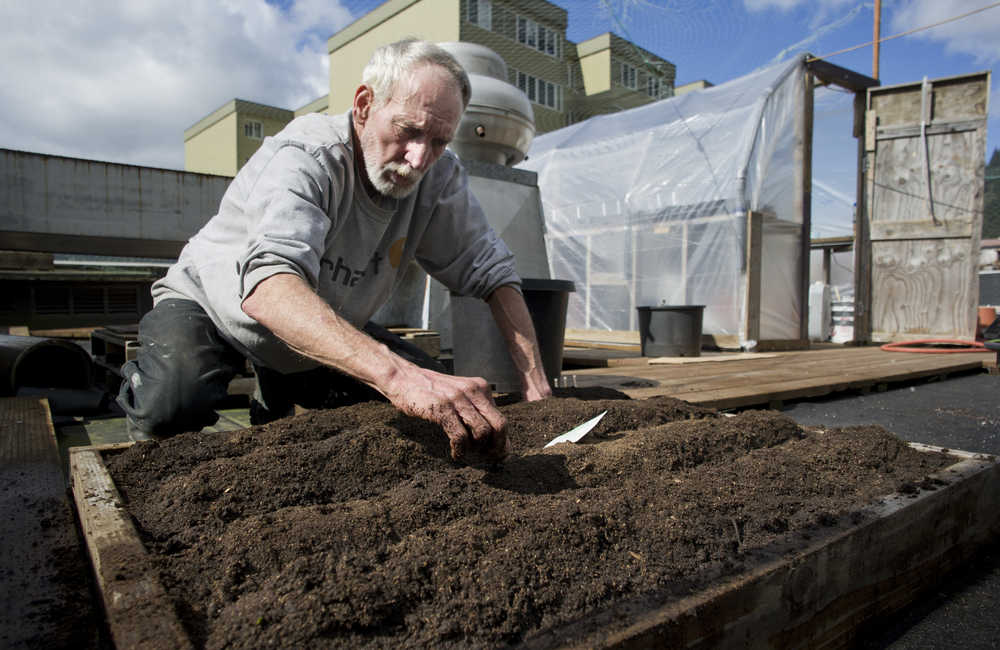Each summer the Glory Hole, downtown Juneau’s homeless shelter and soup kitchen, harvests as much as a quarter of all the produce it uses on site, a task that wouldn’t be possible without the help of two of the shelter’s patrons.
Each spring, shelter patrons sow seeds in the terraced garden that hugs the hill behind the Glory Hole and in the planter boxes on top of the building, the city’s first rooftop garden. By mid to late May, speckled brown and white garden soil yields to the vegetables it has harbored for weeks. The roof comes to life — a vibrant portrait painted in the greens of lettuce, kale, arugula and snow peas and the reds of strawberries and tomatoes.
Most of the shelter’s patrons lend a helping hand in the garden at some point or another. But without the efforts of Mike Ricker and Judy Mauermann, the garden would fail, according to Glory Hole Director Mariya Lovishchuk.
“Everybody does a little bit, but Mike and Judy have been out there consistently,” she said.
Starting in mid-March, Ricker began building the rooftop garden’s two greenhouses, which are critically important for produce such as tomatoes. For the past three years, Ricker has played a key role in setting up the infrastructure that allows the garden to thrive. He also builds a network of wooden walkways on the roof that allow other patrons to safely navigate the garden.
“Every year it gets easier to put together,” Ricker said, explaining the ease comes with experience and with better planning. The key is not to plan too much. “You don’t have to worry too much. It’s all going to come together.”
Ricker finished setting up the garden last week. Though he will continue to work in it wearing a variety of different hats — watering, pulling weeds and even catching slugs — through the end of the season, it’s now Mauermann’s time to shine. It’s her green thumb that truly brings the garden to life.
Like Ricker, Mauermann has only been working in the garden for the past couple of years. (Lovishchuk started it with a grant from the U.S. Department of Agriculture in 2010.) Mauermann spends three hours per day three days a week working “intensely” in the garden, but she said she could spend a lot more time up there than she does.
“I find it really soothing and therapeutic,” she said. “I can get lost in it for hours.”
She has been gardening since she was a child. Her father worked as a farmer and taught her the trade at an early age. A gardener at heart, she carries on her person a copy of “How to Grow Vegetables and Fruits by the Organic Method” — a weighty reference book. All of her experience aside, she says that gardening is less a learned skill than it is an intuition.
“You either like gardening, or you don’t,” she said.
And Ricker proves her point. Unlike Mauermann, he didn’t have any experience gardening until later in life.
“We had a big garden at home when I was a youngster, but I didn’t get any real insight into gardening until my career,” he said, and even then, he wasn’t putting sowing seeds or pulling weeds.
For 27 years, Ricker worked as a swimming pool service contractor in East Texas. During that time, he said that he saw “some of the best backyards in America.” And he became enchanted by the magnificent gardens those yards often contained.
It wasn’t until he arrived in Juneau three years ago that he actually started getting his hands dirty, but he didn’t waste time once he got here. The day after he moved to town he started working in the Glory Hole’s garden. It turns out that he has the knack for it that Mauermann described.
Though the two don’t work alone (they are almost constantly joined by other shelter patrons), they provide a key service that helps to feed 50 to 100 people per day. And that, more than anything else, is Mauermann’s favorite part of the job.
“The most rewarding part is that our work helps a homeless shelter,” she said. “That, and we have the best salads in town.”
• Contact reporter Sam DeGrave at 523-2279 or at sam.degrave@juneauempire.com.

